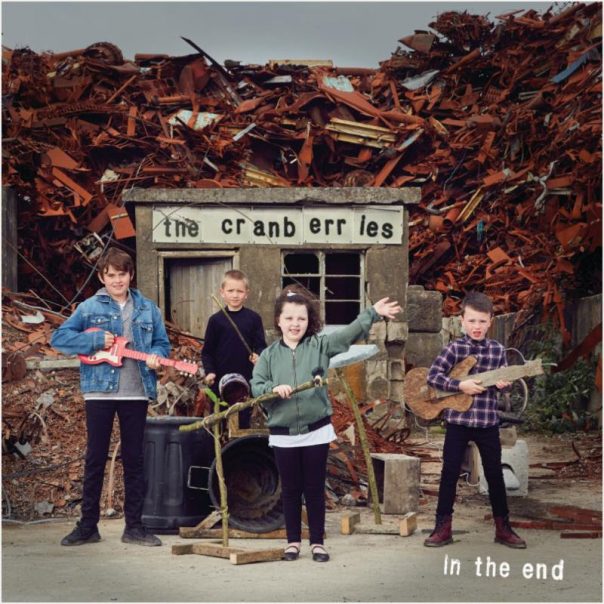ALBUM REVIEW: The Cranberries celebrate and comfort ‘In The End’

The surviving members of The Cranberries faced a moral dilemma in the months following the unexpected death of frontwoman Dolores O’Riordan in January 2018. The band had already written and demoed the 11 songs that ultimately became In The End. Knowing that the album’s skeleton had energized O’Riordan, guitarist Noel Hogan, bassist Mike Hogan and drummer Fergal Lawler revisited the demos during the process of coming to terms with the loss of their friend and bandmate.
In The End
The Cranberries
BMG, April 26
The Cranberries weren’t sure how to approach a final album, knowing that releasing substandard material wouldn’t be a fitting tribute to O’Riordan’s legacy. Upon listening to the material, and consulting with family and friends, the band members decided they had the foundation of a record and worked tirelessly to create a celebratory tribute to O’Riordan’s life and artistry.
The band turned to longtime collaborator Stephen Street, who worked on four of the band’s previous albums, to help with the completion of the record. Street worked by creating tracks and sounds based around O’Riordan’s vocals, constructing entire songs from just the vocal demos.
The result is an album that hearkens back to The Cranberries’ original sounds, a blend of ’90s alternative rock with engaging melodic pop. The album also evokes some of the artists who became inspired by O’Riordan’s pop-rock edge. The songwriting runs the spectrum from heavy and foreboding to jubilant and hopeful.
The album’s opener, “All Over Now,” distills The Cranberries’ classic sound into its finest form. It’s a throwback to the alt-rock and pop of the ’90s. Tight and crunchy guitars and bold, upfront drums lead to a sprawling, reverb-laden chorus. The song’s guitar solo is beautiful, bold and unobtrusive. O’Riordan’s vocals are clean and crisp.
“Lost” is one of the album’s most lyrically heavy moments. The band speaks back to O’Riordan through her own lyrics and vocals as she sings “I’m lost with you/ I’m lost without you/ Bring in the night.” The song’s distorted guitar and dark symphonic overtones prove just as a dramatic, matching O’Riordan’s strong and revealing delivery. “Wake Me When It’s Over” is another callback, with bouncy acoustic verses leading to driving alt-rock chorus with more lyrical guitar work by Hogan. It’s a clear reference point for artists like Alanis Morissette or Avril Lavigne, who were influenced by The Cranberries’ sound.
The ethereal and introspective “A Place I Know” admirably honors the band’s sonics, emphasizing O’Riordan’s soft and pure delivery and lyricism. “Catch Me If You Can,” meanwhile, provides the album’s first hard left turn with a shimmering piano intro, symphonic strings and a choppy guitar effect on the main riff. The song features both O’Riordan’s melodic range as well as her vocal acumen, before breaking into percussive breakdown.
“Got It” has an upbeat electro-acoustic sound up against O’Riordan’s introspective lyrics, another song that holds new weight and meaning with tragic context. “Illusion” brings an acoustic and percussive sound, with Hogan’s bass line fleshing out the backbone of the track.
The bright guitars of “Crazy Heart” bring back a classic alt-rock sound, with O’Riordan singing, “Whatever makes you feel bad/ You know that you’re crazy/ Crazy heart.” “Summer Song” serves as an upbeat acoustic rocker, taking a touching turn with lyrics that read as a note from the band to O’Riordan about their future without her: “How can I go without you know/ How can I live without you when?/ You have become my everything.”
It goes without saying that In The End will be The Cranberries’ final album, solidified by the band publicly stating they would rather leave its legacy rather than continuing on without O’Riordan. The title track runs the gamut from sad and mournful to encouraging and forward-thinking. “Take my hand/ Take the car/ Take the glow/ But you can’t take the spirit,” O’Riordan sings before the haunting final words: “Ain’t it strange/ When everything you wanted/ Was nothing that you wanted/ In the end.” It leaves the listener to reflect on the album’s inherently heavy themes.
In The End serves as a fitting celebration to not only O’Riordan, but a fitting bookend to The Cranberries’ legendary career.
Follow writer Mike DeWald at Twitter.com/mike_dewald.
